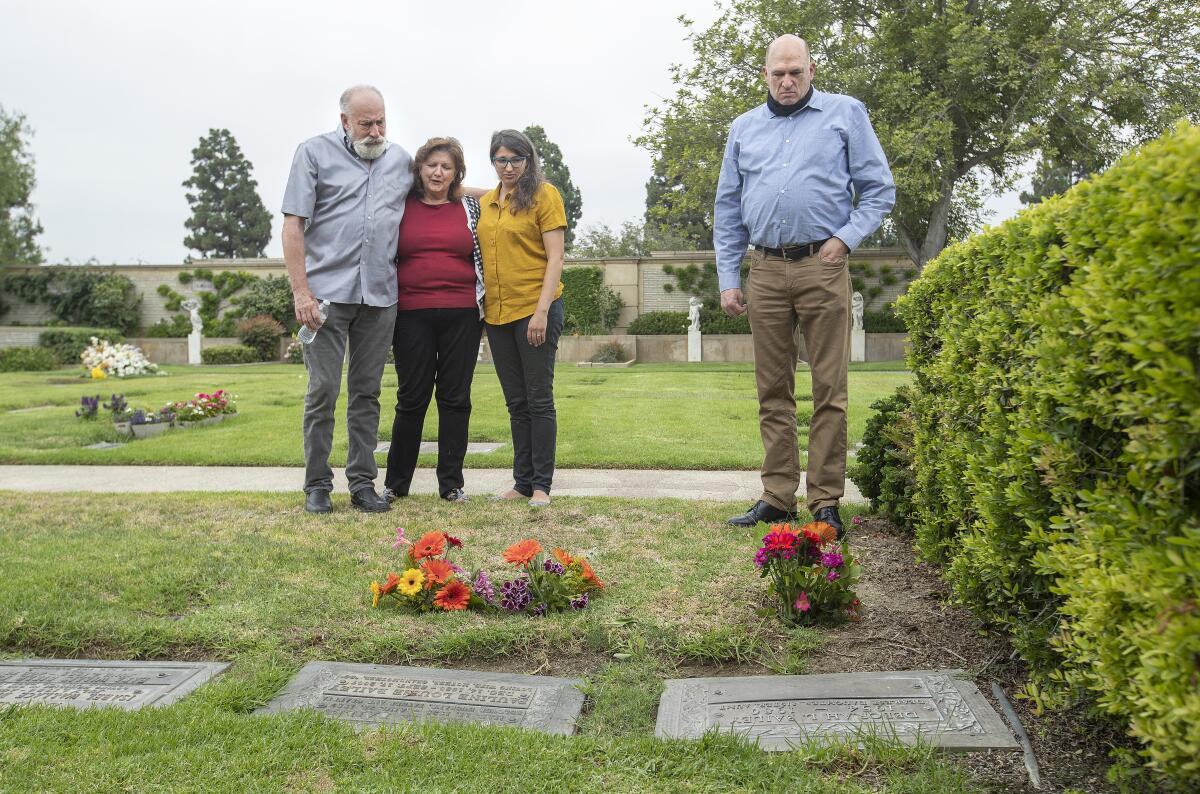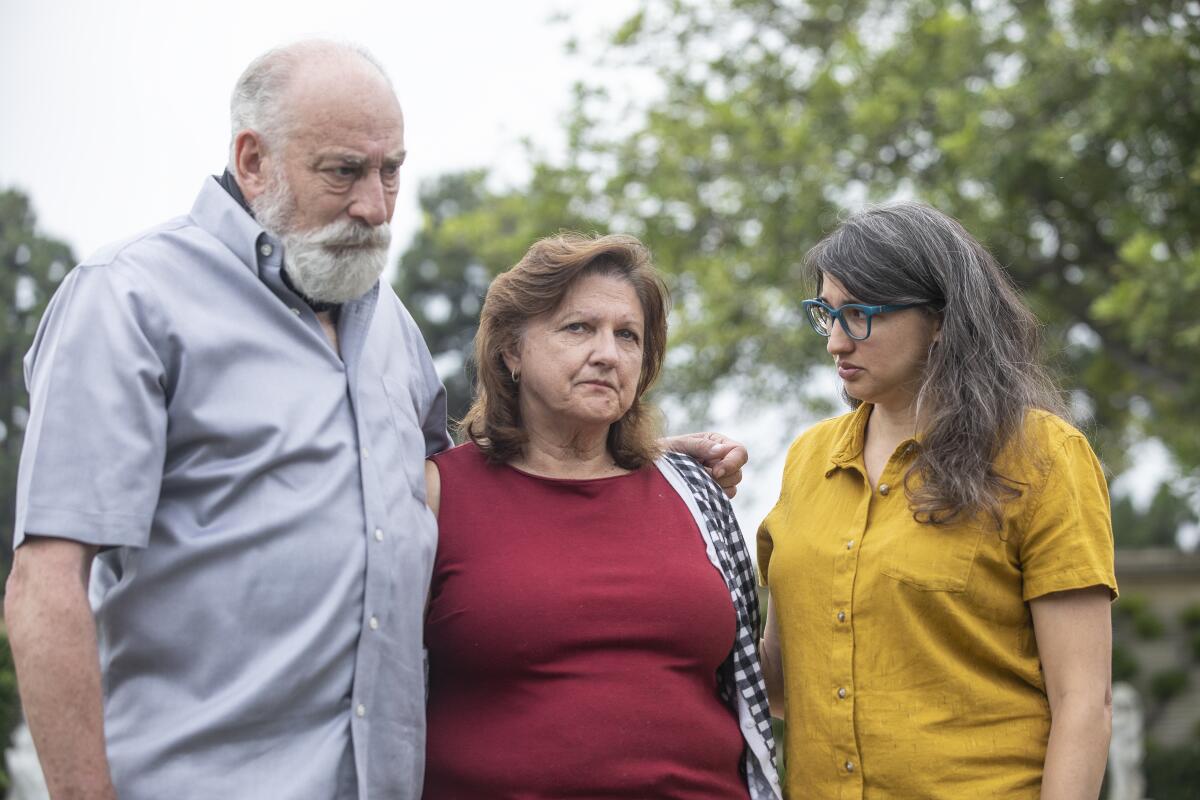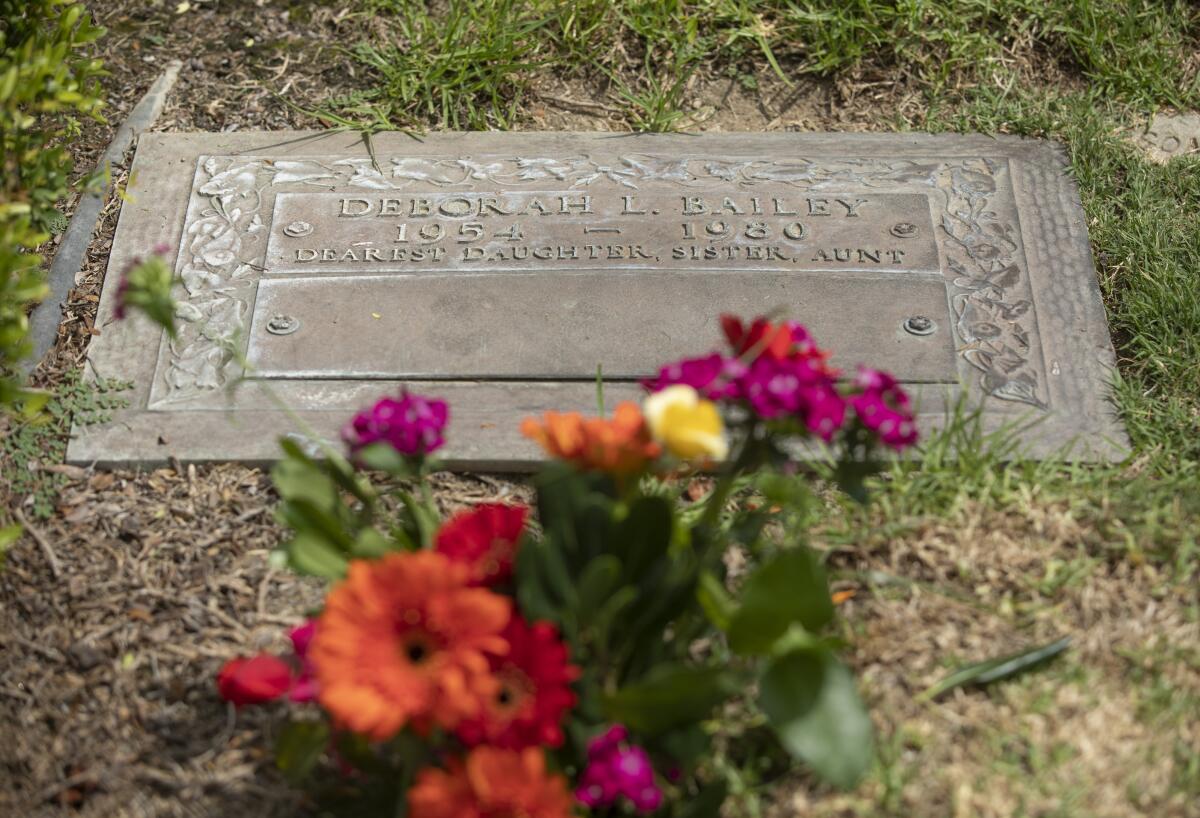Cold-blooded or reformed? Clemency for a killer reopens a family’s wounds

As he scrolled through news stories online last month, Dave Goldsworthy came across an article about Gov. Gavin Newsom’s decision to commute the prison sentences of 21 violent felons.
The last name on the governor’s list stopped him cold: Thomas Waterbury.
“How can that be?” Goldsworthy asked himself.
Waterbury was supposed to live and die in prison. Forty years earlier, he had killed his wife as she slept. The judge left no doubt about his fate: Life in prison without the possibility of parole.
But now, without warning, Waterbury had a chance at freedom.
::
Before dawn on Christmas Eve in 1980, police were called to a modest stucco home on North Lancewood Avenue in Rialto. They found Waterbury crouched on the floor, clutching a green cloth to a chest wound. Saying something about a Mexican intruder, he pointed toward a bedroom, where his wife, Debbie, lay dying, blood streaming down her face from two gunshot wounds.
“It was horrific. There was blood splatter on all four walls and the ceiling,” recalled Terry Waterbury, Thomas’ brother, who arrived in the aftermath of the attack and peered through a window.
With no evidence to support his far-fetched claim of an intruder, suspicion quickly fell on Waterbury, then 22. Ten months later, a jury convicted him of first-degree murder, finding he had killed his wife, in part to collect her $100,000 life insurance policy, then intentionally wounded himself with a gunshot to hide his guilt. An appeals court upheld the conviction and the judge’s sentence.
“You don’t often see a crime that is calculated over such a long period of time and so cold-bloodedly executed,” San Bernardino Deputy Dist. Atty. Raymond Haight III said at the trial.
Debbie’s family figured Waterbury’s punishment was etched in stone. No parole, they assumed, meant just that.
And in the vast majority of cases, it would have. But in California, as in many other states, governors have the power to erase or amend prison sentences in the name of mercy. Each year, inmates flood the governor’s office with requests for clemency. A fortunate few see their wishes filled.
But there are rules to how the governor must wield this immense power — rules meant to protect victims and their families. Before a decision on Waterbury was to be made, state law required that the San Bernardino district attorney’s office make an effort to notify Debbie’s relatives and give them an opportunity to be heard.
That didn’t happen. Though San Bernardino Dist. Atty. Jason Anderson received an email from state officials in October 2019, notifying him the governor was considering Waterbury’s case, a series of bureaucratic fumbles followed. No one contacted the family.
“I dropped the ball on this,” Anderson said in an interview.

Debbie’s parents have passed away. But a sister, brother, niece and various other relatives still live with the memory of her murder. If any of them had had the chance to weigh in, they likely would have told the governor how Waterbury’s plea for clemency was another ploy by an untrustworthy man. “Very deceitful,” Goldsworthy, who is married to Debbie’s sister, said of Waterbury.
They may have mentioned how, for all the time he was married to Debbie, Waterbury was living a double life with another woman; how, court records show, he had introduced this mistress to neighbors as his wife and promised her that the house he shared with Debbie would belong to her by Christmas. They would have mentioned the engagement ring he bought her.
Someone in the family also might have told the governor about a long-held suspicion that, months before he succeeded, Waterbury had made another attempt on her life. One day in February 1980, as Debbie returned from lunch to a dark, warehouse-like office where she worked in downtown Los Angeles, a man wearing a ski mask stabbed her near the heart.
“No way in hell should he be let out. He’s a complete liar, manipulator, sociopath.”
— Terry Waterbury, on brother Thomas Waterbury
The assailant was never caught. Goldsworthy recalled that Debbie never accused Waterbury of the attack, but still opted to stay at her parents’ house for several months after she was released from the hospital.
And if they had been given the chance to speak up, the family would have had an unexpected ally: Waterbury’s own brother.
“No way in hell should he be let out,” Terry Waterbury said. “He’s a complete liar, manipulator, sociopath.”
Terry Waterbury’s low opinion of his older brother stretches back to their childhood. A particular “eye-opener” came when the boys were about 12 and 13. At a backyard barbecue, Thomas intentionally ignited a can of camp stove fuel and hurled it at Terry, who suffered serious burns.
Terry vividly remembers his brother watching him as he burned. “Get the hot dogs,” Thomas said. “Terry’s going good.”
But the governor heard none of this. Instead, Newsom and parole board officials knew only what they saw in Waterbury’s clean prison record and in his application. Newsom’s office declined to provide copies of those documents or to make anyone available for an interview, but Newsom spelled out his reasoning for commuting Waterbury’s sentence in a statement released at the time of his clemency decisions.

The governor believed he had found a man who had met Jesus Christ and energetically practiced his faith behind bars. Although serving a sentence that offered no hope for release, Waterbury had “dedicated himself to his rehabilitation,” Newsom wrote.
Newsom pointed to the Bible classes Waterbury taught and other volunteer work he performed with ministry groups. There was the master’s degree he earned in ministry, and, in 2013, his appointment as provost at the School of Ministry at Mule Creek State Prison.
Perhaps most important, Newsom concluded Waterbury had “expressed sincere remorse” for the murder.
“This act of clemency for Mr. Waterbury does not minimize or forgive his conduct or the harm it caused,” Newsom wrote. “It does recognize the work he has done since to transform himself.”
Debbie’s family members see it differently. To them, Waterbury is the same manipulative, self-serving man he was at 22.
They still have a chance to be heard. Waterbury must appear before the state’s parole board, which will make the final decision on whether he should go free.
In response to an interview request, Waterbury tried unsuccessfully to call a Times reporter. Subsequent attempts to reach Waterbury were unsuccessful. He asked two friends who know him from his time in prison to speak on his behalf. They said they believed Waterbury’s transformation is real.
The state prison system does not keep statistics on how frequently inmates who receive clemency from the governor are denied parole. “It has happened,” said Kate Chatfield, a senior advisor at the Justice Collaborative, a nonprofit group.
Waterbury’s parole hearing, set for Jan. 7, will be conducted over video conference. Debbie’s family plans to recount what they never were able to tell the governor about Waterbury — how there were signs of trouble from the beginning.
::
The wedding of Debbie Bailey and Thomas Waterbury was held on the lawn outside the Huntington Library in San Marino in August 1979.
Bridesmaids wore lavender dresses and twirled parasols, remembered Debbie’s sister, Kathy Goldsworthy. And although Debbie looked the part — she wore a lace dress and a veil — her sister detected something more than wedding day jitters. It was a sense of trepidation. “It was like she wasn’t real sure,” she recalled.
Kathy asked her husband, Dave, to check on her sister. As he looked for her, Dave caught a glimpse of Waterbury smoking pot with some of his groomsmen. “I was like, ‘You gotta be kidding me, man. This is your wedding,’” Dave said.
He found Debbie and pulled her aside.
“I told her, ‘You know, my truck is right here. If you want to leave right now, you don’t have to stay here,’” Dave said. Debbie demurred, assuring Dave her marriage would succeed. Still, Dave sensed hesitation.
The groom’s brother tried to dissuade Debbie as well. Before the young couple drove off for their honeymoon, Terry approached her.
“I told Debbie that she’s the best thing that ever happened to him, and he’s the worst thing that will ever happen to you,” Terry recalled. “Sixteen months later, he proved me right.”
::
“I have been wanting to call you both but, every time I try to tell what realy happen that night I just end up crying & go to pieces.”
— Thomas Waterbury, in a 1981 letter to his slain wife’s parents
In January 1981, as he awaited his murder trial, Waterbury wrote a letter dotted with spelling errors to his dead wife’s parents. His words curved around a skeletal-looking plant design on the left margin of the page.
“I honestly don’t know how or why you could believe I could have hurt Debbie in anyway, as you both know how much I loved her,” he wrote.
“Yes, we had our problem’s like most couples, but we loved each other too much to let anything come between us. I almost lost her last February, and that devestated me,” he wrote, referring to the stabbing.
“I have been wanting to call you both but, every time I try to tell what realy happen that night I just end up crying & go to pieces.”
The letter included a bombshell: After trying for months, Waterbury wrote, Debbie had finally gotten pregnant. He said they had planned to reveal the secret on Christmas Day.
“But like everything in my life it was taken away from me.”
Dave Goldsworthy kept the letter after Debbie’s parents died.
“She wasn’t pregnant,” he said, pointing to the autopsy by the coroner as proof. “It was all just smoke and mirrors.”
In January, it will be up to the parole board to decide whether Waterbury is a changed man.
If he is set free, he plans to move first to LIFEHouse, a reentry group home in Placerville, near Sacramento, run by Jesus Our Boss, said Alicia Sinsley Reuscher, the nonprofit group’s executive director.
To Debbie’s family, his return to the outside world would restart a story they thought had already been written.
Over the decades, the fury and sorrow they felt about Debbie’s death dimmed into a dull ache. Photos of Waterbury were burned long ago. Somewhere along the way, he faded into being just a terrible memory and an inmate number: C38792.
They took comfort in knowing he was locked away. His story, which became Debbie’s story, had been too outrageous. Too painful.
But now, come January, there will be another chapter.
More to Read
Sign up for Essential California
The most important California stories and recommendations in your inbox every morning.
You may occasionally receive promotional content from the Los Angeles Times.











